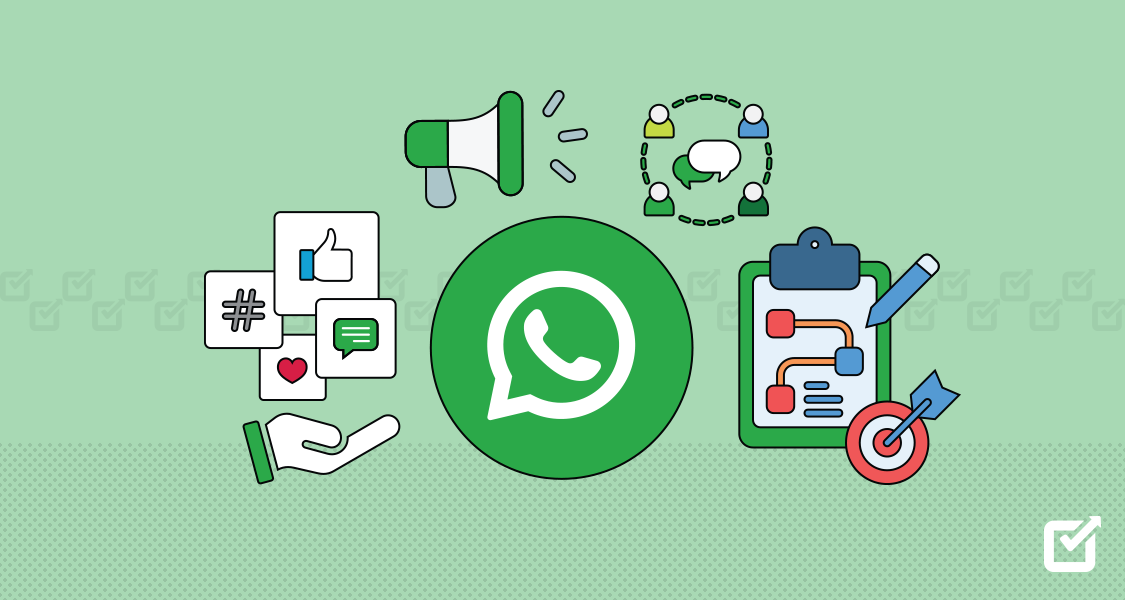WhatsApp Marketing refers to the use of WhatsApp, a popular messaging platform, as a tool to communicate with customers and promote products, services, or brands. Given the platform’s extensive reach, security, and high engagement rates, WhatsApp marketing has become a powerful channel for businesses to interact with their audience in a more personalized and direct manner.

Here’s a breakdown of what WhatsApp Marketing involves:
1. WhatsApp Business Account
- WhatsApp Business is a free app designed for small and medium-sized businesses to interact with customers.
- It allows businesses to set up a business profile with details such as address, description, website, and contact information.
- WhatsApp Business API is for larger businesses and enables automated messaging, CRM integration, and more advanced features like chatbot use, bulk messaging, etc.
2. Key Features of WhatsApp Marketing:
- Personalized Messaging: WhatsApp allows you to send one-on-one messages, giving businesses an opportunity to provide tailored customer service and support.
- Broadcast Lists: Businesses can create broadcast lists to send messages to multiple customers at once without them seeing each other’s responses. This ensures a more personal feel compared to other mass marketing tools.
- Group Chats: Businesses can create group chats to engage a specific community or segment of their customers.
- Rich Media Messaging: WhatsApp allows sharing of text, images, videos, documents, and even voice messages, which enhances customer engagement.
- Automated Responses: Set up automated replies for common customer queries using WhatsApp Business features or chatbots.
3. Types of WhatsApp Marketing Strategies:
- Customer Support and Interaction: Provide customer service and resolve issues in real-time. WhatsApp can be used to offer product recommendations, assist with troubleshooting, or even handle post-purchase inquiries.
- Product Promotions and Offers: Send special promotions, discounts, or product launches directly to your customer base via WhatsApp messages.
- Event Reminders and Invitations: Send reminders for upcoming events, webinars, or sales, ensuring higher attendance and participation.
- Transactional Messages: For example, order confirmations, shipping notifications, and payment receipts.
- Lead Generation: Businesses can collect customer details (with their consent) and engage them with targeted marketing, offers, and follow-ups.
- Surveys and Feedback Collection: Collecting customer feedback or conducting surveys via WhatsApp to gauge satisfaction or preferences.
4. Advantages of WhatsApp Marketing:
- High Engagement Rates: WhatsApp messages have a much higher open rate compared to emails or other forms of messaging. This makes it an excellent tool for communication.
- Instant Communication: WhatsApp allows instant two-way communication, fostering a strong connection with customers.
- Global Reach: WhatsApp has over 2 billion users worldwide, making it a powerful tool for international businesses to reach out to customers across different regions.
- Cost-Effective: Since WhatsApp is free to use (aside from potential costs related to the API for large businesses), it’s a budget-friendly marketing option.
- Direct Communication: Unlike email or social media, WhatsApp is more direct and personal, which can help build trust with customers.
5. WhatsApp Marketing Best Practices:
- Obtain Permission: Always ensure that you have consent from users before sending marketing messages. Unsolicited messages can lead to customers unsubscribing or even reporting your business.
- Segment Your Audience: Use customer segmentation to send tailored messages that are relevant to each group (e.g., based on past purchases or geographic location).
- Keep Messages Short and Concise: WhatsApp is a fast-paced platform, so keep messages short and to the point. Avoid spamming users with excessive messages.
- Timing is Key: Avoid sending messages at inconvenient times. Be mindful of time zones and customer preferences.
- Use Media Wisely: Include images, videos, and audio to enhance your messaging and make it more engaging. But don’t overwhelm the customer with too many files.
- Offer Value: Make sure the message provides real value to the customer, whether it’s in the form of a special discount, useful information, or prompt customer service.
6. Measuring Success in WhatsApp Marketing:
- Engagement Metrics: Track the number of messages read, responded to, and the overall interaction rate.
- Conversion Rate: Monitor how many customers are taking action based on the messages sent (e.g., making a purchase after receiving a promo).
- Customer Feedback: Collect feedback on your messaging approach and adjust as necessary.
7. Challenges and Considerations:
- Privacy Concerns: WhatsApp is a private messaging platform, so users may be sensitive to receiving unsolicited marketing messages. Always respect privacy and data protection regulations (like GDPR).
- Message Volume: While WhatsApp can be effective for engagement, sending too many messages might lead to customers unsubscribing or feeling overwhelmed.
- API Costs: For larger businesses, utilizing WhatsApp Business API can incur costs. However, these can be worth the investment given the scale of engagement and automation it provides.
In conclusion, WhatsApp marketing offers businesses a unique and effective way to connect with customers. By using personalized, real-time communication, businesses can enhance customer relationships, boost engagement, and drive sales. However, it’s crucial to approach this medium responsibly, respecting customer preferences and maintaining privacy standards.